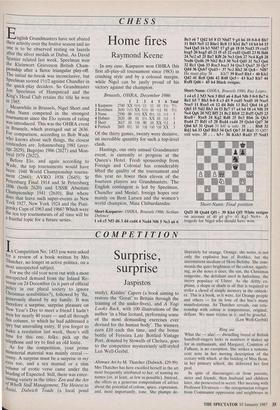COMPETITION
Surprise, surprise
Jaspistos
In Competition No. 1453 you were asked for a review of a book written by Mrs Thatcher, no longer in active politics, on a Most unexpected subject. For me the old year went out with a most unexpected demand from the Inland Re- venue on 24 December (is it part of official Policy in our plural society to ignore Christmas sensibilities?), followed by 'flu, gene ro usly shared by my family. It was therefore a surprise, surprise pleasure on New year's Day to meet a friend I hadn't seen for nearly 40 years — and all through this column, to which he had addressed a Spry but unavailing entry. If you forgot to Make a resolution last week, there's still time for this one, folks: pick up the telephone and try to find an old lostie.
As for the competition, your prime Ministerial material was mainly cereal — Corny. A surprise must be a surprise in my eyes too, and a sex manual or a slim volume of erotic verse came under the heading of Expected. Still, there was enter- Mining variety in the titles: Zen and the Art Of Whelk Stall Management, The Heiress to ilssisi, Dulwich Toads (a local pond study), Kiddies' Capers (a book aiming to restore the 'Great' to Britain through the training of the under-fives), and A Yogi Looks Back, with 100 illustrations of the author 'in a blue leotard, performing some of the most demanding exercises ever devised for the human body'. The winners earn £10 each this time, and the bonus bottle of Ferreira Late Bottled Vintage Port, donated by Stowells of Chelsea, goes to the competitor mysteriously self-styled Len Well-Gerbil.
Abstract Art by M. Thatcher (Dulwich, £29.99). Mrs Thatcher has here excelled herself in the art most frequently attributed to her: of naming no names (or, at least, as few as possible). Instead, she offers us a generous compendium of advice about the potential of colour, space, expression, and, most importantly, tone. She plumps de-
liberately for orange. Orange, she notes, is not only the explosive hue of Rothko, but the intermittent medium of Hore-Belisha. She com- mends the quiet brightness of the colour, signify- ing, as she notes it does, the sun, the Christmas tangerine, the defoliant used in Indochina, the merry populace of Ulster. As she deftly ex- plains, a shape or shade is all that is required to strike a chord of simple memory in the onlook- er. This is a book, as it were, for Orange people and others — for its love of the hue's many manifestations. As Thatcher reveals, our rela- tionship with colour is tempestuous, original, defiant. We must rejoice in it, and be grateful.
(Len Well-Gerbil) Ring out What the — alas! — dwindling breed of British handbell-ringers lacks in numbers it makes up for in enthusiasm, and Margaret, Countess of Fulham, is no exception. She strikes a reminis- cent note in her moving description of the ecstasy with which, at the bidding of Miss Bean, in her primary school, she delivered her first peal.
In spite of discouragem.;nt from parents, sister and friends, then husband and children later, she persevered in secret. Her meeting with Professor Elvarescu — the octogenarian refugee from Communist oppression and neighbours in his native Rumania — was the turning point. He passed on to her the technique of raula and double-spin and she achieved the rare triple vibrato.
The book is full of wise tips (rest the bells on velvet but wrap in raw silk). Two small points: it is not historically proven that Pythagorean adepts practised handbell-ringing and the handbell-ringing Pope on page 39 is Clement XIII not XVIII.
(George Moor)
A redeeming grace of Westminster is that House of Commons animosities, however impassioned, usually end at the Smoking Room door. Since such magnanimity is not commonly credited to our lately-retired Leaderene, one is all the more impressed by the adulatory — nay, well-nigh fawning — tone of For Heath's a Jolly Good Fellow, her memoir to commemorate the for- tieth anniversary of his first election.
Drawing on the recollection of countless cronies — from Broadstairs dorm-chums to Morning Glory shipmates — she reveals just how much it cost her to repress too embarras- singly obvious signs of the hero-worship that, during her own first years in the House, she found welling up irresistibly in her breast.
Only very slowly came the realisation that she must 'for the nation's sake' be 'not an Antony but a Brutus'. The agony with which she wielded the knife that others had thrust inexorably into her grasp is, as she freely confesses in her 'Let This Cup Pass' chapter, still always with her . . .
(Martin Fagg) Teach Your Budgie to Speak It was always to be expected that when the author left public life to pursue her own interests she would address them with a single-minded energy few can emulate. This book, the first fruit of her private passion, bears out that expectation fully.
Her recommended method for training budgerigars is based on three axioms:
— freeze the budgerigar with unflinching eye contact;
— repeat the message until the budgerigar goes into a trance-like state; — by speaking continuously, prevent the budgerigar from speaking until you are confident that it can repeat only the message you have taught it.
These principles are emphasised clearly, many times, throughout the book. It is safe to say that had the author's energies not been tragically diverted to politics, She would have made as great an animal trainer as Barbara Woodhouse would a Prime Minister.
(Noel Petty)
Margaret Thatcher's new paperback, at only £1.95, is remarkable value for money. First Aid for the Over-70s is a comprehensive handbook which can be highly recommended.
The `over-70s' in the title refers of course to those giving first aid, not those receiving it, and Mrs Thatcher demonstrates convincingly that retirement from active public life is no reason to stop helping others. Photographs skilfully and amusingly taken by the author, with her hus- band as the patient, illuminate every aspect of the subject. A photograph of attention being given for multiple injuries shows clearly the enthusiasm with which the author approaches her work.
The text is rather more authoritarian than is usual, but this is an advantage where immediate and decisive action is required. The section nn the treatment of poisoning reminds us that Mrs Thatcher retains that lively interest in chemistry that gained her a degree nearly 60 years ago. (O. A. Robinson)











































 Previous page
Previous page